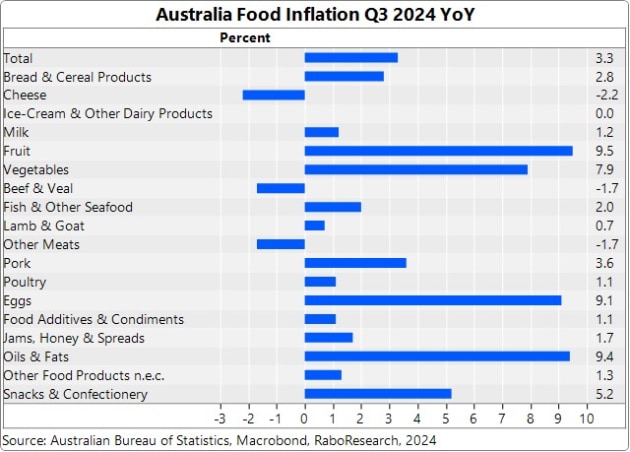The latest quarterly Consumer Price Index (CPI) data from the Australian Bureau of Statistics has shown that although overall headline inflation eased in the latest quarter, the annual rate of food price inflation held fast at 3.3 per cent.
The September 2024 quarter data saw overall annual food price inflation – comparing prices with the September 2023 quarter – remain at the same rate (3.3 per cent) seen in the June quarter, which was the lowest quarterly food price inflation number since December 2021 (at 1.9 per cent).
Quarter on quarter, prices in the ‘Food and non-alcoholic beverages’ category rose 0.6 per cent.
RaboResearch senior food retail analyst, Michael Harvey, said the annual rate of food price inflation was still higher than average, with the 10-year average tracking at 2.7 per cent, but there was some good news for consumers when it came to food prices.
The data showed a general moderation in inflation across many key categories – including bread, spreads and condiments – and some limited price deflation in categories, including beef and veal and cheese.

“For dairy, there has been promotional activity in the cheese category which has been a driver in some of the lower pricing seen here, and it is expected lower retail milk prices we have seen on some supermarket shelves in recent weeks will come through in the December quarter CPI data,” said Harvey.
“While butter is not a specific item measured in CPI data, consumers are paying higher prices for butter as record high global butter prices are felt in supermarket shelves here, and with Australia being a sizable importer of butter.”
Annual inflation in the food service category had moderated to 2.9 per cent in the September quarter, compared with the June quarter, where food service prices had increased 4.2 per cent year on year.
Harvey said a spike was seen in annual price inflation for fresh produce (both fruit and vegetables), overall at 8.6 per cent. However, he emphasised this needed to be seen in the context of a comparably weak September 2023, when prices were down -6.4 per cent on the previous year.
“For the September 2024 quarter, the ABS does cite higher prices for berries, grapes, tomatoes and capsicum contributing to the rate of inflation in this category due to unfavourable growing conditions,” he said.
“However, with the summer season now approaching, we are starting to see good volumes and lower prices in some fruit and vegetable products.”
Harvey said there were some problematic categories worth noting in the latest CPI data when it came to food prices.
“Cooking oils remain a clear red flag for consumers with an annual inflation rate of 9.4 per cent,” said Harvey.
“While this is a lower rate of inflation than seen in the previous quarter, it follows on from two years of high inflation in this category – on a cumulative basis, quarterly price inflation is running at +42 per cent since March 2022. This reflects global pricing driven by supply shocks in the Mediterranean.”
Harvey said there had also been an uptick in the rate of inflation in the snacks and confectionery category – annual price rises of 5.2 per cent in the September quarter compared with 4.6 per cent in the June quarter – as the impact of higher global cocoa prices feeds through.
Annual inflation for egg prices also increased to 9.1 per cent this quarter, compared with an annual inflation rate of 6.5 per cent in the June quarter.
“And with all these categories – cooking oil, snacks and confectionery and eggs – consumers have been seeing prices rising since 2022,” he said.
Overall, Harvey said, the cost of the average food basket for Australian households was likely to remain high in the near term.
“Consumers are continuing to respond with their food purchasing choices. There is a big focus on promotion and activity to cater to the value-conscious consumer,” he said.






